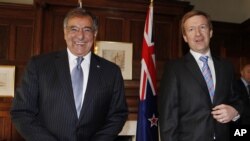AUCKLAND, NEW ZEALAND —
U.S. Defense Secretary Leon Panetta says all 33,000 troops who went to Afghanistan as part of a surge of forces three years ago have now left the country.
The U.S. Defense Secretary Leon Panetta called the withdrawal a very important milestone in the allied forces' effort to transfer security responsibility to Afghan security forces.
Panetta made the announcement Friday at a joint news conference with New Zealand's defense minister in Auckland - the last stop of a week-long trip to the Asia-Pacific region.
"The United States military has completed drawing down the surge forces President Obama committed in December of 2009, reducing our presence by 33,000 troops, and it was done on schedule," he said.
President Obama ordered the surge in 2009 with the goal to break the momentum of Taliban insurgents by enabling Afghan forces to take and hold on to territory. With much of Afghanistan now under the control of Afghan forces, Defense Secretary Panetta says plans are on track to pull all remaining allied combat troops out of the country by 2014.
"As we reflect on this moment, it's an opportunity to recognize that the surge did accomplish its objectives of reversing Taliban momentum on the battlefield and dramatically increased the size and capability of the Afghan National Security Forces," he said.
The drawdown has been carried out gradually over the last few months. The removal of 33,000 troops leaves 68,000 U.S. troops - down from a high of more than 100,000 a year ago.
The pullout coincides with a spike in the number of insider attacks by Afghan forces, who have turned their weapons their international counterparts. The incidents have raised concerns among some in Washington - including Chairman of the Joint Chiefs of Staff General Martin Dempsey - who has called the number of attacks a very serious threat.
Panetta on Friday said General John Allen, the top U.S. commander in Afghanistan, has assured him the remaining number of American troops is sufficient to accomplish the mission.
New Zealand was the last stop on a Pacific tour that included visits to Japan and China. Panetta on Friday thanked New Zealand's armed forces for their contributions to the Afghan war effort.
The U.S. defense secretary went to Auckland's War Memorial Museum and laid a wreath to honor New Zealand soldiers who have been killed in various wars, including Afghanistan. New Zealand has lost 10 soldiers in the Afghan war - five of them last month.
As part of the visit, Panetta announced the United States has relaxed a restriction that banned New Zealand navy ships from entering U.S. military ports. The U.S. imposed the restriction in 1985 when New Zealand banned nuclear powered ships and vessels carrying nuclear weapons from its waters - a move that was followed by Washington's suspension of its defense treaty with the country.
Panetta is the first U.S. defense secretary to visit New Zealand in 30 years.
The U.S. Defense Secretary Leon Panetta called the withdrawal a very important milestone in the allied forces' effort to transfer security responsibility to Afghan security forces.
Panetta made the announcement Friday at a joint news conference with New Zealand's defense minister in Auckland - the last stop of a week-long trip to the Asia-Pacific region.
"The United States military has completed drawing down the surge forces President Obama committed in December of 2009, reducing our presence by 33,000 troops, and it was done on schedule," he said.
President Obama ordered the surge in 2009 with the goal to break the momentum of Taliban insurgents by enabling Afghan forces to take and hold on to territory. With much of Afghanistan now under the control of Afghan forces, Defense Secretary Panetta says plans are on track to pull all remaining allied combat troops out of the country by 2014.
"As we reflect on this moment, it's an opportunity to recognize that the surge did accomplish its objectives of reversing Taliban momentum on the battlefield and dramatically increased the size and capability of the Afghan National Security Forces," he said.
The drawdown has been carried out gradually over the last few months. The removal of 33,000 troops leaves 68,000 U.S. troops - down from a high of more than 100,000 a year ago.
The pullout coincides with a spike in the number of insider attacks by Afghan forces, who have turned their weapons their international counterparts. The incidents have raised concerns among some in Washington - including Chairman of the Joint Chiefs of Staff General Martin Dempsey - who has called the number of attacks a very serious threat.
Panetta on Friday said General John Allen, the top U.S. commander in Afghanistan, has assured him the remaining number of American troops is sufficient to accomplish the mission.
New Zealand was the last stop on a Pacific tour that included visits to Japan and China. Panetta on Friday thanked New Zealand's armed forces for their contributions to the Afghan war effort.
The U.S. defense secretary went to Auckland's War Memorial Museum and laid a wreath to honor New Zealand soldiers who have been killed in various wars, including Afghanistan. New Zealand has lost 10 soldiers in the Afghan war - five of them last month.
As part of the visit, Panetta announced the United States has relaxed a restriction that banned New Zealand navy ships from entering U.S. military ports. The U.S. imposed the restriction in 1985 when New Zealand banned nuclear powered ships and vessels carrying nuclear weapons from its waters - a move that was followed by Washington's suspension of its defense treaty with the country.
Panetta is the first U.S. defense secretary to visit New Zealand in 30 years.




